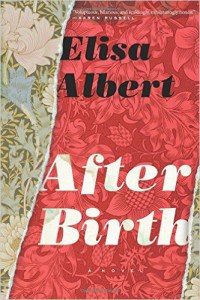 I’m not quite sure what Elisa Albert wanted to tell the world in her book After Birth. If it’s that she’s suffering from postpartum depression, okay. I get it. Or that she’s having difficulty adjusting to a relocation? Okay, been there…done that. Or that she feels overwhelmed in a new phase of life? Fine, get that too. Babies can do that, you know. They can overwhelm you, make you more tired than you ever dreamed possible, reduce you to solitary tears at all times of the day and night. But apparently Ms. Albert believes she is the only one to have ever experienced this phenomenon. She stated in an interview that “the very fact that we tend to see motherhood as somehow not universal is problematic.” Whoa there! NEWS FLASH. Motherhood is universal. Never even knew that was disputed.
I’m not quite sure what Elisa Albert wanted to tell the world in her book After Birth. If it’s that she’s suffering from postpartum depression, okay. I get it. Or that she’s having difficulty adjusting to a relocation? Okay, been there…done that. Or that she feels overwhelmed in a new phase of life? Fine, get that too. Babies can do that, you know. They can overwhelm you, make you more tired than you ever dreamed possible, reduce you to solitary tears at all times of the day and night. But apparently Ms. Albert believes she is the only one to have ever experienced this phenomenon. She stated in an interview that “the very fact that we tend to see motherhood as somehow not universal is problematic.” Whoa there! NEWS FLASH. Motherhood is universal. Never even knew that was disputed.
(This post may contain affiliate links; as an Amazon associate I earn from qualifying purchases. See disclosure here.)
Although the author has moments when she aptly captures the essence of feminine angst, it is hard to appreciate the poignancy of her writing because every paragraph seems to contain the F bomb. Why she felt the need to use such vulgarity throughout the novel, I don’t understand. Except that she’s angry. Very angry. And, in my opinion, she’s also rather mislead. No, Elisa, you are not the only one to have experienced postpartum depression. You are not the only one to have a Cesarean childbirth. You are not the only one to feel very alone in the presence of a brand new miracle. So get over yourself.
If you’re looking for a book to spur lots of spirited discussion at your next book club, this is it. After Birth. But if you prefer one that is actually beautiful and intriguing to read, choose another.


